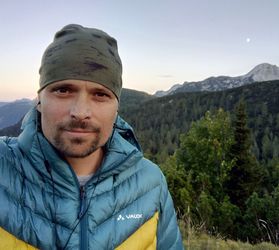Institut für Sozialwissenschaften (» Postanschrift)
Dr. Kai P. Willführ

Dr. Kai P. Willführ ist wissenschaftlicher Mitarbeiter am Institut für Sozialwissenschaft an der Carl von Ossietzky Universität Oldenburg. Kai forscht interdisziplinär in Evolutionärer Anthropologie, Demografie und anderen Gebieten der quantitativen Sozialwissenschaften. Ein Forschungsschwerpunkt liegt hierbei auf Familiennetzwerken und wie diese historische und rezente Lebensverläufe beeinflussen. Hierzu startet am 15. September 2021 das für drei Jahre angelegte Forschungsprojekt: "Kinship effects or affected kinship? – Investigating the functioning of family networks by their impact on adult mortality and fertility", welches durch die Deutsche Forschungsgemeinschaft unterstützt wird (DFG GZ: WI 4446/2-1). Hier geht es zur Website des Projekts.
Curriculum Vitae
Mar/2025 - today Guest Researcher at the Carl von Ossietzky University of Oldenburg, Germany, Methods of Empirical Social Research
Mar/2019 - today Guest Researcher, Center for Economic Demography, Department of Economic History, University of Lund, Sweden
Apr/2020 - Feb/2025 Research Scientist at the Carl von Ossietzky University of Oldenburg, Germany, Methods of Empirical Social Research
Oct/2019 - Mar/2020 Administration of the professorship for “Methods of Empirical Social Research” at the Carl von Ossietzky University in Oldenburg (Germany) on an interim basis
Sep/2017 – Sep/2019 Research Scientist at the Carl von Ossietzky University of Oldenburg, Germany, Methods of Empirical Social Research
Apr/2014 – Aug/2017 Research Scientist at the Max Planck Institute for Demographic Research, Rostock, Germany. Laboratory of Population Health
Jun/2015 – Mar/2015 Guest Scientist at the Max Planck Institute for Demographic Research, Rostock, Germany.
Jun/2014 – Mar/2014 Associated member of the Institute for Philosophy, Justus‐Liebig‐University Giessen (JLU), Germany.
Jun/2014 – Sep/2014 Consultant for The London School of Economics and Political Science (LSE)
Jun/2013 – May/2014 Research Scientist at the Max Planck Institute for Demographic Research, Rostock, Germany. Laboratory of Evolutionary Biodemography
Nov/2010 – May/2013 Post-Doctoral Fellow at the Max Planck Institute for Demographic Research, Rostock, Germany. Max Planck Research Group: Lifecourse Dynamics and Demographic Change
May/2007 – Oct/2010 Research assistant at the ‘Center of Philosophy and Foundations of Science’, Justus‐Liebig‐University Giessen (JLU)
Oct/1998 – Jan/2005 Study of Biology at the Justus‐Liebig‐University Gießen (JLU) Areas of specialization: Bio‐Philosophy, Genetics, Plant physiology
Publikationen
Fachartikel (peer-reviewed)
XX - Willführ KP, Sottile Perez J (2025) The Aftermath of the February Flood of 1825: Social and Demographic Change in the Krummhörn Region, East FrisiaExplorations in Economic History. Volume 96, 101650 doi.org/10.1016/j.eeh.2024.101650
XIX - Willführ KP, Klüsener S (2024) Current "dramatically" high paternal ages at childbirth are not unprecedented. Human Reproduction. doi:10.1093/humrep/deae067
XVIII - Ross CT, Hooper PL, Smith JE, Jaeggi AV, Smith EA, Gavrilets S,...Willführ KP,…Borgerhoff Mulder M (2023). Reproductive inequality in humans and other mammals. Proceedings of the National Academy of Sciences, 120(22), e2220124120. doi:10.1073/pnas.2220124120
XVII - Filser A, Willführ KP (2022) Sex ratios and union formation in the historical population of the St. Lawrence Valley. PLoS One 17(6): e0268039. doi.org/10.1371/journal.pone.0268039
XVI - Willführ KP, Eriksson, B, Dribe, M (2021). The impact of kin proximity on net marital fertility and maternal survival in Sweden 1900–1910—Evidence for cooperative breeding in a societal context of nuclear families, or just contextual correlations? American Journal of Human Biology, e23609. doi.org/10.1002/ajhb.23609
XIV - Pink KE, Willführ KP, Voland E, Puschmann P (2020) Effects of individual mortality experience on out of wedlock fertility in 18th and 19th century Krummhörn, Germany. Human Nature. doi.org/10.1007/s12110-020-09368-3
XIV - Willführ KP, van Dijk IK (2019) Another Helping - A Plea for an Interdisciplinary Perspective on the Role of Kin over the Life Course. Historická demografie 43:157-181.
XIII - Johow J, Willführ KP, Voland E (2019) High consanguinity promotes intergenerational wealth concentration in socioeconomically privileged Krummhörn families of the 18th and 19th centuries. Evolution & Human Behavior 40: 204-213. https://www.sciencedirect.com/science/article/abs/pii/S1090513818301053
XII - Cody T. Ross, Monique Borgerhoff Mulder, Seung-Yun Oh, Samuel Bowles, Bret Beheim, John Bunce, Mark Caudell, Gregory Clark, Heidi Colleran, Carmen Cortez, Patricia Draper, Russell D. Greaves, Michael Gurven, Thomas Headland, Janet Headland, Kim Hill, Barry Hewlett, Hillard S. Kaplan, Jeremy Koster, Karen Kramer, Frank Marlowe, Richard McElreath, David Nolin, Marsha Quinlan, Robert Quinlan, Caissa Revilla-Minaya, Brooke Scelza, Ryan Schacht, Mary Shenk, Ray Uehara, Eckart Voland, Kai Willführ, Bruce Winterhalder, John Ziker (2018) Greater wealth inequality, less polygyny: rethinking the polygyny threshold model. Journal of the Royal Society Interface 15: 20180035. doiI:10.1098/rsif.2018.0035
XI - Arslan RC, Willführ KP, Frans EM, Verweij KJH, Bürkner, P-C, Myrskylä M, . . . Penke L (2018). Relaxed selection and mutation accumulation are best studied empirically: reply to Woodley of Menie. Proceedings of the Royal Society B: Biological Sciences, 285(1873), 20180092. doi:10.1098/rspb.2018.0092
X - Willführ KP, Johow J, Voland E (2018) When the mother-in-law is just as good—Differential mortality of reproductive females by family network composition. PLoS ONE 13(3):e0193252. doi:10.1371/journal.pone.0193252
IX - Arslan RC, Willführ KP, Frans E, Verweij KJH, Bürkner P-C, Myrskylä M, Almqvist C, Zietsch BP, Penke L. (in 2017). Older fathers’ children have lower evolutionary fitness across four centuries and in four populations. Proceedings of the Royal Society B: Biological Sciences,284 (1862) doi:10.1098/rspb.2017.1562.
VIII - Voland E, Willführ KP (2016) Why does paternal death accelerate the transition to first marriage in the C18-C19 Krummhörn population? Evolution & Human Behavior. doi.org/10.1016/j.evolhumbehav.2016.08.001
VII - Fox J, Willführ KP, Gagnon A, Dillon L, Voland E (2016) The consequences of sibling formation on survival and reproductive success across different ecological contexts: A comparison of the historical Krummhörn and Quebec populations. The History of the Family. DOI:10.1080/1081602X.2016.1193551
VII - Willführ KP, Störmer C (2015) Long-term trends and short-term fluctuations in the reproductive behavior of landless agricultural workers, small farmers, and the economic elite in the historical Krummhörn region (East Frisia, Germany, 1720-1870) Historical Life Course Studies 2, 58-85.
V - Willführ KP, Myrskylä M (2014) Disease load at conception predicts survival in later epidemics in a historical French-Canadian cohort, suggesting functional trans-generational effects in humans. PLoS One 9:4, e93868-e93868.
IV - Willführ KP, Myrskylä M (2013) Phenotype-Environment Mismatch Due to Epigenetic Inheritance? Programming the Offspring’s Epigenome and the Consequences of Migration. American Journal of Human Biology 25(3):318-328. doi.org/10.1002/ajhb.22362
III - Willführ KP, Gagnon A (2013) Are Step-parents Always Evil? Parental Death, Remarriage, and Child Survival in Demographically Saturated Krummhörn (1720-1859) and Expanding Québec (1670-1750). Biodemography & Social Biology 59(2):191-211. doi.org/10.1080/19485565.2013.833803
II - Willführ KP, Gagnon A (2012) Are Stepmothers Evil or Simply Unskilled? Infant Death Clustering in Recomposed Families. Biodemography & Social Biology 58(2):149-61. doi.org/10.1080/19485565.2012.734745
I - Willführ KP (2009) Short‐ and Long‐term Consequences of Early Parental Loss in the Historical Population of the Krummhörn. American Journal of Human Biology 21(4):488‐500. doi.org/10.1002/ajhb.20909
Beiträge in Büchern und Sammelbänden
VII - Willführ KP (2024) Evolutionäre Familienforschung – Kosten-Nutzen-Bilanzen an der Schnittstelle zwischen Verwandtenselektion und sozialem Kontext. In: Hammerl M, Schwarz S, Willführ KP (2024) Evolutionäre Sozialwissenschaften. Springer: Heidelberg doi.org/10.1007/978-3-658-43624-7_6
VI - Hammerl M, Schwarz S, Willführ KP (2024) Evolutionäre Sozialwissenschaften – Ein interdisziplinäres Randprojekt oder eine kleine Revolution? In: Hammerl M, Schwarz S, Willführ KP (2024) Evolutionäre Sozialwissenschaften. Springer: Heidelberg doi.org/10.1007/978-3-658-43624-7_1
V - Willführ KP, Fox J, Voland E (2024) Historical Family Reconstitution Databases in the Study of Kinship Influences on Demographic Outcomes. In O. Burger, R. Lee, & R. Sear (Eds.), Human Evolutionary Demography. (pp. 645 - 662). OpenBook Publishers. doi.org/10.11647/OBP.0251
IV - Schnettler S, Willführ KP (2019) Step-Parenting. In: Shackelford T., Weekes-Shackelford V. (eds) Encyclopedia of Evolutionary Psychological Science. Springer, Cham. doi.org/10.1007/978-3-319-16999-6_2301-1
III - Willführ KP, Störmer C (2016) Crop prices and demographic outcomes - A critical re-evaluation of the proxy. In: Matthijs K, Hin SC, Kok J, Matsuo H (eds.) The future of historical demography: upside down and inside out. Acco: Leuven
II - Johow J, Voland E, Willführ KP (2013) Reproductive Strategies in Female Post-Generative Life. In: Fisher ML, Garcia JR, & Chang RS (eds.) Evolution's Empress: Darwinian Perspectives on the Nature of Women. Oxford University Press: New York
I - Störmer C, Willführ KP (2010) Mortality Crises and Their Consequences for Human Life‐Histories. In: Frey U, Störmer C, Willführ KP (eds.) Homo novus. A Human without illusions. Springer: Heidelberg
Arbeitspapiere
Willführ KP (in prep) Kinship effects or affected kinship? - Differential mortality of reproductive females by family network composition
Willführ KP & Preetz R (in prep) Investing until it is too late? – Does Life History Theory explain the maladaptive postponement of childbirth?
Bücher
III - Hammerl M, Schwarz S, Willführ KP (eds.) (2024) Evolutionäre Sozialwissenschaften – Ein Rundgang. Springer: Heidelberg
II - Frey U, Störmer C, Willführ KP (eds.) (2010) Essential building blocks of human nature. Contributors: Grammer K, Kappeler P, Krebs N, Mace R, Shenk M, Schmidt‐Salomon M, Sosis R, Purzycki B, Rösler F, Uhl M. Springer: Heidelberg
I - Frey U, Störmer C, Willführ KP (eds.) (2010) Homo novus. A Human without illusions. Contributors: Bayertz K, Chasiotis A, Dunbar R, Euler H, Fischer J, Kanitscheider B, Pradel J, Fetchenhauer D, Roth G, Sear R, Sommer V, Parish A, Vogel C & Vollmer G. Springer: Heidelberg
Sonstige Publikationen
Willführ KP, van Hedel K, Myrskylä M (2016) Eine Langzeitperspektive auf die Entwicklung sozialer Unterschiede bei der Lebenserwartung. MPIDR Forschungsbericht. doi.org/10.17617/1.2N
Forschungsprojekte
Research Project: "Historical comparison puts recent 'dramatic' increases in paternal ages at birth in perspective"
Research Project: "Trading descendants for persistence – Understanding the cost-benefit-ratio of consanguinity"

